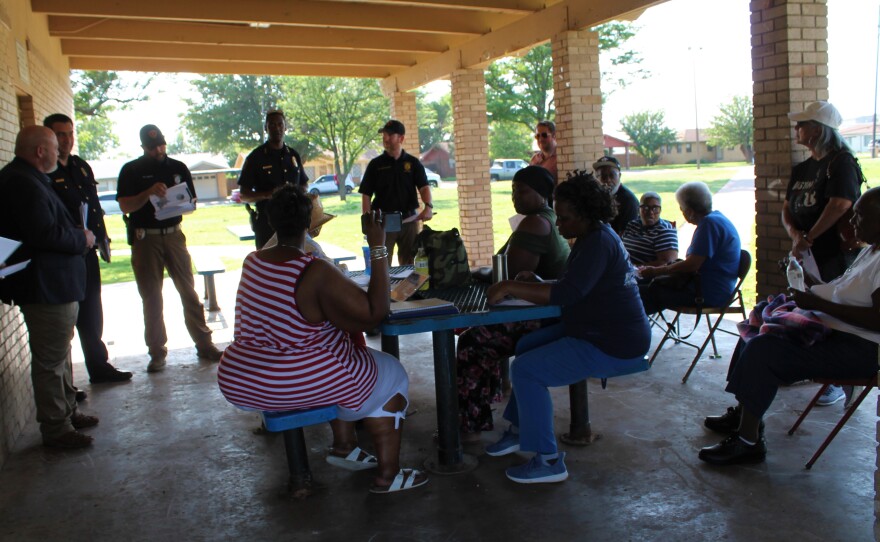Jafar Abdullah brought three books to read lakeside at his neighborhood park on a recent warm afternoon. He gave a synopsis of each one. The top book is about the history of Islam and the bottom book is about poverty. In the middle is “The New Jim Crow” by Michelle Alexander, a title Abdullah said came highly recommended by one of his mentors.
The 2012 book challenges the idea of racial colorblindness in the criminal justice system. It equates the mass incarceration of Black Americans to a class system that can affect generations.
It’s an issue Abdullah thinks about often. Especially when he’s working with kids through the mentorship program he started.
“You can explain to them how that system works,” Abdullah said. “And that has to be from individuals that look like them and that they relate to.”
How to interact with police is a hard, but necessary, conversation in communities of color. One that Abdullah said is happening even more often in East Lubbock right now.
Abdullah looked up the hill from the Historic Dunbar Lake to the East Division Station that’s expected to open next month. It’s the first of three regional stations, as the Lubbock Police Department moves away from centralized operations and toward community-policing. It’s a change years in the making. But Abdullah still has apprehensions.
“Police don't necessarily make me feel safe as a Black man in America,” he said.
Abdullah said if he feels that way, then he worries about how the kids he works with feel.
“Speaking to the youth, they feel like it's an invasion of their space,” Abdullah said about the new police station overlooking a park. “And oftentimes when they feel as if their spaces are invaded, they coil up and now they have to be tough.”
Abdullah shared his concerns at an April community meeting with the Lubbock Police Department.
“Our elders are happy to have a police presence,” he said then. “But I’ll tell you, I invited about 40 young men here. From the ages of, 13 was our youngest, all the way up to about 27, 28. There’s not one of them in here.”
Assistant Police Chief Nathan White, who was at that April meeting, said it’s heartbreaking to hear comments like that.
“Our whole career has been dedicated to helping people. And it's hard to hear that they're afraid of us, because to me, it doesn't make sense, because I see it from this side,” White said. “The only thing that I know to do is to reach out and have conversations.”
White has been at several community gatherings since. He and other officers have gone to neighborhood meetings to better connect with people.
“With us going to our division stations, the ability to meet people, hang out with people, have coffee, talk about issues is going to be much better for us as a community,” Clay Trotter said at a recent Dunbar-Manhattan Heights Neighborhood Association meeting.
Trotter is the community engagement officer for the East Division police station. He patrolled East Lubbock before focusing on homeless outreach. He said he knows and likes the area. But he’s still learning from residents at these neighborhood meetings.
“I think that we've learned that we can improve on some relationship building,” Trotter said. “We have to have those candid conversations.”
So far, a lot of the conversations have focused on specific concerns. Police have said at these meetings that they need to know about these things and encouraged people to call about them. Drivers speeding in residential areas and crime at neighborhood parks have been brought up, as well as abandoned properties.
Kids are a consistent concern.
After hearing about a teenager who was recently killed in Lubbock, Chatman Hill Neighborhood Association President Renee Cage challenged her neighbors to look out for the kids in their lives.
“Kind of going back to old school and using the neighborhood to nurture our youth so that they value life,” Cage said.
Abdullah would like to see more of this, too. He grew up in East Lubbock. And recalls, as a kid, when he would do something wrong, his parents knew about it before he even got home because multiple neighbors already called to tell them.
“That accountability needs to be there,” Abdullah said. “That communication needs to be there.”
That’s the kind of community policing Abdullah wants to see — neighbors looking out for neighbors.
A new season of Texas Tech Public Media’s multimedia series “Beyond The Report” looks at how Plan Lubbock 2040 could affect neighborhoods that feel forgotten. For more, visit beyondthereportlbk.com.
Have a news tip? Email Sarah Self-Walbrick at saselfwa@ttu.edu. Follow her reporting on Twitter @SarahFromTTUPM.
If you found the reporting above valuable, please consider making a donation to support local nonprofit journalism. Thanks for donating today.





